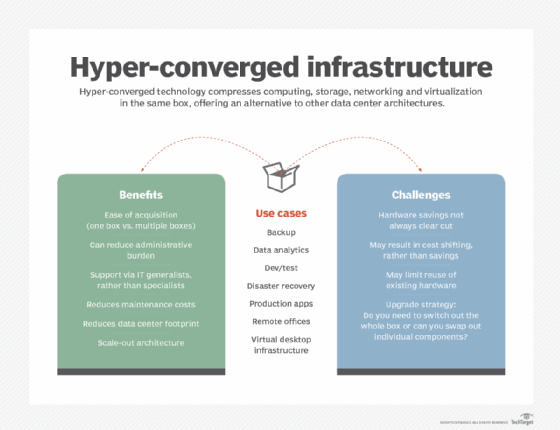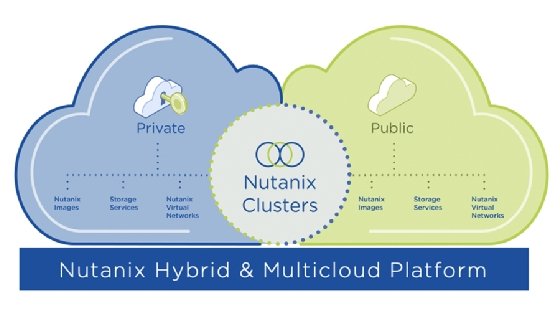Nutanix
What is Nutanix?
Nutanix is a private and hybrid cloud software provider. It started as a hyperconverged infrastructure (HCI) pioneer that now markets its technology as a building block for private clouds.
The company was founded in 2009 by Dheeraj Pandey, Mohit Aron and Ajeet Singh, and it is based in San Jose, Calif.
Nutanix started by offering hyperconverged appliances, which converge storage, compute and virtualization into one box. Initially targeting VMware customers, Nutanix branched out after VMware released its own virtual storage area network (VSAN) hyperconverged platform. The vendor's products now support Microsoft Hyper-V and KVM hypervisors, as well as VMware vSphere and Nutanix's own KVM-based Acropolis Hypervisor (AHV).
Nutanix now offers a hardware- and provider-agnostic software platform that focuses on managing virtualized resources from a single application. These products include a central management hub, management platform, unified storage, database management and virtual desktop infrastructure.
Nutanix software works with many vendors. Original equipment manufacturer (OEM) partners Dell and Lenovo rebrand Nutanix software on their x86 servers, and Nutanix channel partners package the vendor's software on Cisco and Hewlett Packard Enterprise (HPE) servers. IBM also has an OEM deal with Nutanix to sell its software on Power servers. Their products also integrate with Amazon Web Services (AWS) and Microsoft Azure.

Nutanix company history
Nutanix came out of stealth in 2011 with Complete Cluster, one of the first hyperconverged storage products on the market. In June 2013, Complete Cluster was rebranded as Virtual Computing Platform, and two new configurations with smaller and larger capacities were added to the line.
In its first two years, company revenue surpassed $100 million. In June 2014, Nutanix entered into an OEM deal with Dell that allowed Nutanix software to be sold on Dell PowerEdge servers.
In December 2015, Nutanix filed for an initial public offering, reporting revenue of $241.1 million for the year. Though the IPO took nine months to complete, Nutanix revenue grew 125% to $166.8 million in its first quarter as a public company. However, losses were also high at $162.2 million.
In 2017, Nutanix leadership focused its business model on the company's software. While the vendor still sold appliances, it continued selling software on any vendor's x86 hardware and counted revenue only from its software business.
In June 2017, Nutanix announced a partnership with Google that enables customers to deploy and manage workloads across Google Cloud Platform and its in-house HCI through a single interface.
In 2018, Nutanix began pivoting toward hybrid cloud and monitoring solutions.
Since then, Nutanix launched its Clusters service for AWS, acquired desktop-as-a-service vendor Frame and released a streamlined edition of Nutanix Cloud Platform.
More recently, Nutanix expanded its product portfolio to encompass remote and edge locations, extended data services to container applications and announced Project Beacon, which aims to deliver data-centric platform as a service.
Nutanix revenue for 2023 was $1.86 billion, up from $1.58 billion the previous year.

Major Nutanix products and their important features
Despite a push to focus primarily on being a software company, Nutanix products include both software and turnkey appliances. Here are some of the vendor's major products and services:
- Nutanix Prism is a single-pane control software that can unify the monitoring and management of Nutanix resources. It can be deployed on premises or as software as a service (SaaS). It uses machine learning technology to help manage, monitor and analyze the vendor's HCI.
- Nutanix Cloud Infrastructure is the core product to deploy virtualized resources. It works with all major public cloud provers and virtualization technologies, including VMware ESXi and Microsoft Hyper-V. It also includes a built-in Linux-based hypervisor, AHV. It also supports Kubernetes deployment and management.
- Nutanix Flow is a virtualized networking software and network security suite. It works as a software firewall and supports zero-trust networking.
- Nutanix Cloud Manager provides automated fault, cost and security risk management. It can optimize deployments and help right-size cloud deployments. This helps with cost and capacity planning.
- Nutanix Unified Storage supports file, block and object storage management. Storage can be tiered and automatically backed up.
- Nutanix Database Service can deploy and manage databases. It integrates with all major database providers and custom deployments. It can automate new database creation, cloning and backups.
Nutanix's main competitors
Although Nutanix was the first hyperconverged vendor to make a big splash in the market, it is far from alone now. Based on research, experts and sources such as the Gartner Magic Quadrant and Fortune Business Insights, other important HCI companies include the following:
- Dell EMC not only sells Nutanix software in its XC Series on PowerEdge servers, but it competes with Nutanix with a vSAN-based VxRail appliance from VMware, which it owns.
- HPE made acquisitions to bolster its HCI products. HPE acquired early Nutanix competitor SimpliVity for $650 million, and it now sells SimpliVity software on ProLiant servers. While Nutanix software supports HPE servers, HPE has no relationship with Nutanix, and it recommends its own SimpliVity software on ProLiant servers.
- Storage vendor NetApp entered the HCI market in 2017, using its SolidFire Element OS as the basis of the all-flash NetApp HCI product. NetApp HCI is technically considered a disaggregated, software-defined architecture, but it can be deployed for use cases similar to HCI and uses the same high-density unit appliance as Nutanix and other HCI vendors.
- Nutanix's Google partnership puts it in competition with AWS, which has partnered with VMware to target an enterprise market with on-premises workloads.
- Lenovo, which partners with Nutanix and other HCI software vendors, also sells hyperconverged appliances.
Additional major HCI competitors include Huawei, IBM, Microsoft, Pivot3, Sangfor, Scale Computing, SmartX and StorMagic.
HCI has found a home in data centers since its emergence. The technology is rapidly changing and evolving, however. Learn more about what HCI has to offer, and explore hyperconvergence trends.







